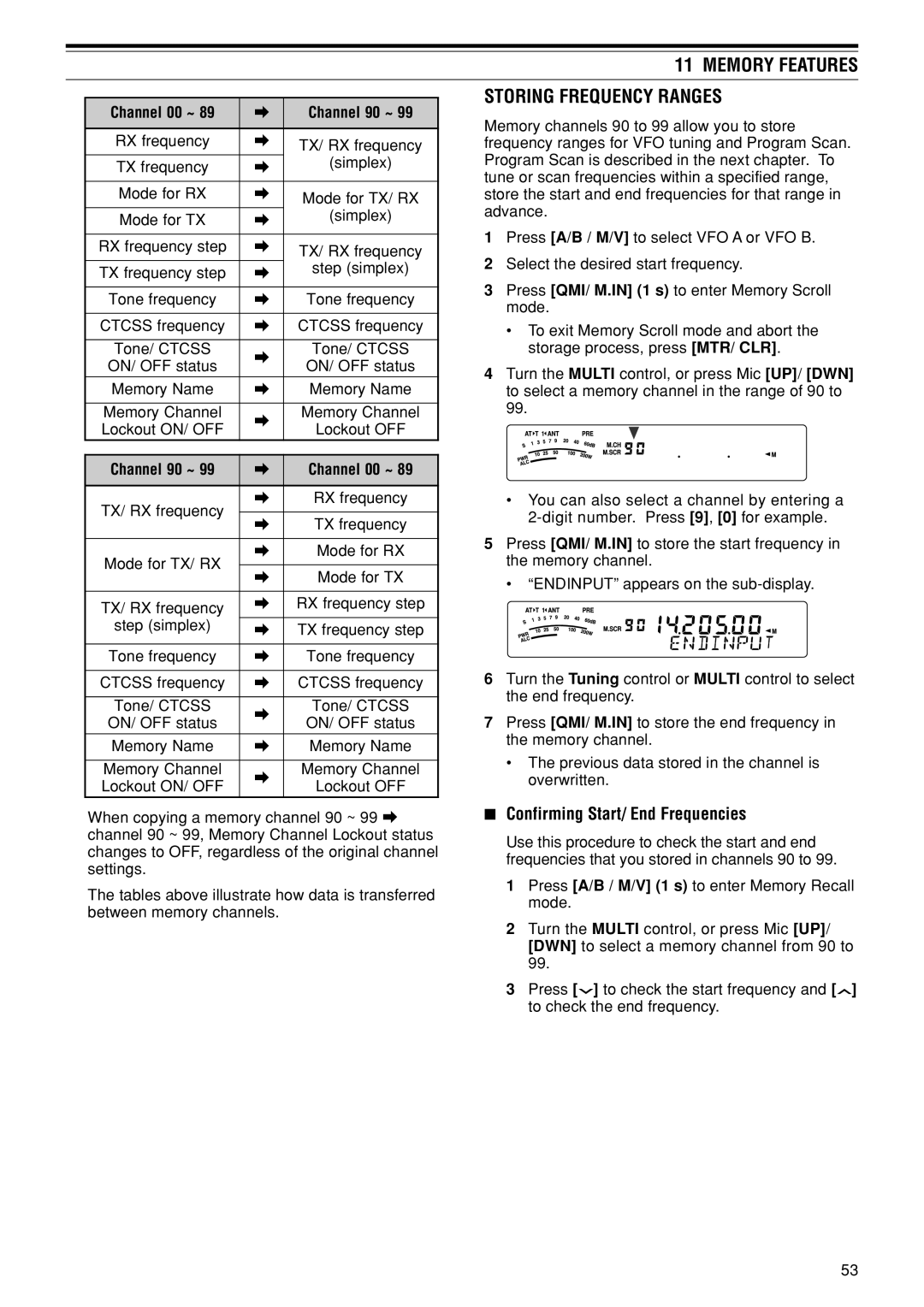
11 MEMORY FEATURES
Channel 00 ~ 89 | a | Channel 90 ~ 99 | |
|
|
| |
RX frequency | a | TX/ RX frequency | |
TX frequency | a | (simplex) | |
| |||
|
|
| |
Mode for RX | a | Mode for TX/ RX | |
Mode for TX | a | (simplex) | |
| |||
|
|
| |
RX frequency step | a | TX/ RX frequency | |
TX frequency step | a | step (simplex) | |
| |||
|
|
| |
Tone frequency | a | Tone frequency | |
|
|
| |
CTCSS frequency | a | CTCSS frequency | |
|
|
| |
Tone/ CTCSS | a | Tone/ CTCSS | |
ON/ OFF status | ON/ OFF status | ||
| |||
|
|
| |
Memory Name | a | Memory Name | |
|
|
| |
Memory Channel | a | Memory Channel | |
Lockout ON/ OFF | Lockout OFF | ||
| |||
|
|
| |
Channel 90 ~ 99 | a | Channel 00 ~ 89 | |
|
|
| |
TX/ RX frequency | a | RX frequency | |
|
| ||
a | TX frequency | ||
| |||
|
|
| |
Mode for TX/ RX | a | Mode for RX | |
|
| ||
a | Mode for TX | ||
| |||
|
|
| |
TX/ RX frequency | a | RX frequency step | |
step (simplex) | a | TX frequency step | |
| |||
|
|
| |
Tone frequency | a | Tone frequency | |
|
|
| |
CTCSS frequency | a | CTCSS frequency | |
|
|
| |
Tone/ CTCSS | a | Tone/ CTCSS | |
ON/ OFF status | ON/ OFF status | ||
| |||
Memory Name | a | Memory Name | |
|
|
| |
Memory Channel | a | Memory Channel | |
Lockout ON/ OFF | Lockout OFF | ||
|
When copying a memory channel 90 ~ 99 a channel 90 ~ 99, Memory Channel Lockout status changes to OFF, regardless of the original channel settings.
The tables above illustrate how data is transferred between memory channels.
STORING FREQUENCY RANGES
Memory channels 90 to 99 allow you to store frequency ranges for VFO tuning and Program Scan. Program Scan is described in the next chapter. To tune or scan frequencies within a specified range, store the start and end frequencies for that range in advance.
1Press [A/B / M/V] to select VFO A or VFO B.
2Select the desired start frequency.
3Press [QMI/ M.IN] (1 s) to enter Memory Scroll mode.
•To exit Memory Scroll mode and abort the storage process, press [MTR/ CLR].
4Turn the MULTI control, or press Mic [UP]/ [DWN] to select a memory channel in the range of 90 to 99.
•You can also select a channel by entering a
5Press [QMI/ M.IN] to store the start frequency in the memory channel.
•“ENDINPUT” appears on the
6Turn the Tuning control or MULTI control to select the end frequency.
7Press [QMI/ M.IN] to store the end frequency in the memory channel.
•The previous data stored in the channel is overwritten.
■Confirming Start/ End Frequencies
Use this procedure to check the start and end frequencies that you stored in channels 90 to 99.
1Press [A/B / M/V] (1 s) to enter Memory Recall mode.
2Turn the MULTI control, or press Mic [UP]/ [DWN] to select a memory channel from 90 to 99.
3Press [![]() ] to check the start frequency and [
] to check the start frequency and [![]() ] to check the end frequency.
] to check the end frequency.
53
